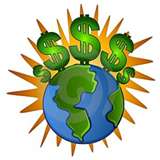By Jeffrey Dorfman
University of Georgia
After several long years of financial angst, people the world over are weary from recession depression. The prolonged economic drag has plenty of pundits asking: “What in the world happened?”
Many factors have been suggested, some agreed upon and others argued. But, to really understand what caused the severe recession that we have just experienced in the U.S. and around the world, we have to look back to the previous recession in 2001.
The cause of that recession is clear: the dot-com bubble in technology stocks burst. Unfortunately, many Americans didn’t start investing in the stock market until the 1990s and had experienced nothing but rising stock markets. Making money seemed so easy.
Losing money as tech stocks plunged was a new and unpleasant sensation. Many people decided they didn’t like it. Millions of Americans began looking for somewhere else to put some or all of their money. They found their place in real estate.
Risky business
As Americans poured trillions into home improvement and new home purchases -- first homes, bigger homes and vacation homes -- home prices soared. People discovered a new investment class—real estate—where you could make money faster than in the stock market and enjoy the asset at the same time. We replaced the dot-com bubble with a real estate bubble that was even bigger and had a dangerous flaw the stock-market bubble lacked: debt.
The stock market crash in the Depression was made worse by the use of margin accounts which allowed investors to borrow money to buy stocks. With borrowed money, even a small drop in value can cause investors to lose everything. The government passed regulations to strictly limit using margins in stock investing. However, real estate had no such limits.
Buyer confidence that housing prices would continue to climb led Americans to borrow lots of money to buy houses. They borrowed even more money in home equity to buy other stuff. Banks, in turn, borrowed money to lend out in mortgages.
People looking to get rich (or at least have good jobs) went into homebuilding. Many became developers, often using borrowed money.
Housing bust
When things went bad, neither the homeowners, nor the homebuilders, developers or banks had much equity in the deals. The drop in home prices was enough to bankrupt many lenders, builders and developers, and to push homeowners into foreclosure.
To compound things, during the last four years before the recession, people increased their non-mortgage debt by 25 percent. They entered the recession with little available credit for a cushion. At the same time, state and local governments allowed their budgets to grow rapidly as all the housing-boom-fueled tax revenue flowed in.
Now people, banks and governments must go through a painful period of paying down debt and adjust to living on a smaller budget.
Recessions are a reallocation of resources when the economy gets out of balance. We had too much investment and employment centered in construction, the financial sector and state and local government. With too much invested in a single sector of the economy, some investments must go bad (such as new homes that go unsold). A recession allows an economy to recoup what it can from the over-invested sectors and steer the money that is left into different, more productive sectors.
It hasn’t been fun, but the worst is over.
(Jeffrey Dorfman is an economist with the University of Georgia College of Agricultural and Environmental Sciences. This is part one of a three-part series titled Rising from Recession. In part two, he explains how Americans know the recession has ended. In part three, he looks to the future.)








